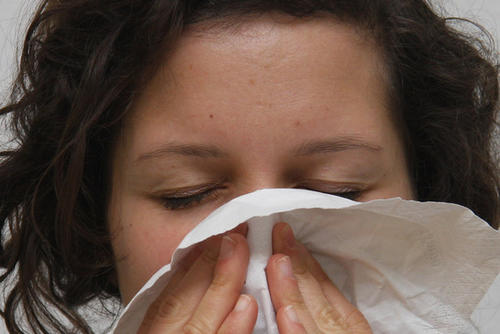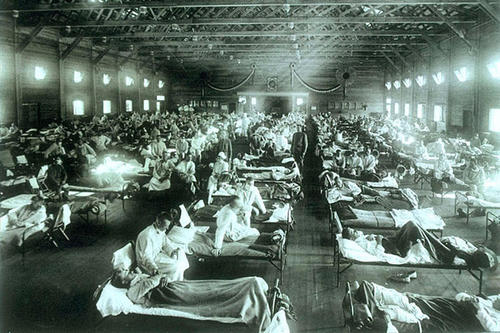Managing Uncertainty
Researchers at the Institute of Management study how we deal with unforeseeable outbreaks of disease
Jan 31, 2012
Business managers and veterinarians work together as part of the "Epidemic Communicator - Uncertainty as a Trigger for Service Innovation" project at the Institute for Management Research.
Image Credit: Marina Kosmalla
Between 1918 and 1920 the Spanish flu killed at least 25 million people. The picture shows a military emergency hospital in Kansas during the pandemic.
Image Credit: National Museum of Health and Medicine, Armed Forces Institute of Pathology, Washington, D.C., United States.
This question is now being pursued by researchers at Freie Universität Berlin within the research project “Epidemic Communicator – Uncertainty as a Trigger for Service Innovations.” The project, which is hosted by the Institute of Management at the School of Business and Economics and is managed by Gordon Müller-Seitz, is receiving 40,000 euros in research funding from the Peter Pribilla Foundation. Müller-Seitz holds a doctorate in business and is currently serving as a professor for a limited term at the Universität Göttingen.
Recognizing Uncertainties and Extrapolating Recommendations
During the research project, the scholars aim to study three different outbreaks of disease (E. coli, Salmonella, and Listeria) over the past two years. The key issue here is the question of how the institutions involved – such as the Robert Koch Institute (RKI), the German government’s central body for monitoring and prevention of disease – deal with the fundamental uncertainty always present before an epidemic emerges. The goal of the research is to identify certain patterns in dealing with uncertainties and use them to map out possible recommendations for actions to take in the future so that responses to a new outbreak can be faster and more effective.
Collaboration between Economists and Veterinarians
Müller-Seitz considers the project’s interdisciplinary alignment to be important. “By working with our colleagues in veterinary medicine, we aim to supplement the business administration perspective to good effect by adding findings from the natural sciences,” he explains. While the scientists try to pinpoint how and where the first person was infected, where the pathogen came from, and how the illness was then able to spread, the business scholar will consider the question of how certain players – such as the Robert Koch Institute – deal with the disease’s unexpected outbreak.
Development of an "App"
In addition to the case analyses, which look at the actions of public organizations and institutions, part of the project aims to make it possible to provide private individuals with better information. The researchers plan to develop a smartphone app, for example, that users can use to quickly access information from the website of a trustworthy public institution in the event of an outbreak. If another E. coli outbreak were to occur, for example, users could use this tool to get information on risks of infection and symptoms of illness right away. The aim of the app is to help individuals better assess their health risks and prevent panic – thereby helping to make it easier to cope with uncertainty in everyday life.
Further Information
Dr. Gordon Müller-Seitz, School of Business and Economics, Freie Universität Berlin, Institute of Management, Tel.: +49 (0)30 838-56359, Email: gordon.mueller-seitz@fu-berlin.de


